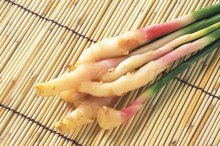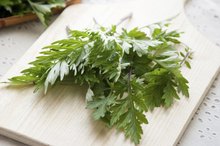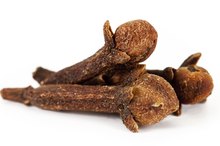Warnings About Taking Skullcap
Skullcap is a term used to refer to two different herbs. American skullcap, or Scutellaria lateriflora, is an herb native to North America, and is used as a tranquilizer and sedative, according to the University of Maryland Medical Center 1. Traditional Chinese physicians recommend Chinese skullcap, or Scutellaria baicalensis, as a remedy for headaches, infections and allergies. These herbs may cause several side effects and other health problems.
If you are experiencing serious medical symptoms, seek emergency treatment immediately.
Drowsiness
American skullcap is a powerful sedative, according to Michael Castleman, author of "The Healing Herbs." This herb may cause drowsiness 2. You should not take skullcap during waking hours, particularly if you plan to drive a car or operate heavy machinery.
Hypoglycemia
Herbal Remedies for Xanax Withdrawal Symptoms
Learn More
The chemical compounds in Chinese skullcap may lower blood glucose, according to the University of Maryland Medical Center 1. Low blood glucose, or hypoglycemia, may produce symptoms such as:
- fatigue
- mental confusion
- disorientation
- muscle weakness
- fainting
Avoid Chinese skullcap if you have hypoglycemia or diabetes.
Seizures
Concentrated amounts of the chemical compounds found in American skullcap may contribute to seizures, muscle twitches and convulsions, according to Castleman. You may have an increased risk of seizures if you use this herb in tincture form, which contains high amounts of these chemicals. Avoid using American skullcap tinctures if you have epilepsy or nerve damage.
Other Side Effects
What Herbs Are Similar to Metoprolol?
Learn More
American skullcap may cause feelings of giddiness or euphoria, according to the University of Maryland Medical Center 1. It may also cause arrhythmia, or irregular heartbeat. You may also experience diarrhea or stomach upset when using American skullcap, notes Castleman.
Chinese skullcap may cause stomach pains, and it could damage your spleen.
- American skullcap may cause feelings of giddiness or euphoria, according to the University of Maryland Medical Center 1.
- You may also experience diarrhea or stomach upset when using American skullcap, notes Castleman.
Related Articles
References
- University of Maryland Medical Center: Skullcap
- "The Healing Herbs"; Michael Castleman; 1991
- Bonham M, Posakony J, Coleman I, et al. Characterization of chemical constituents in Scutellaria baicalensis with antiandrogenic and growth-inhibitory activities toward prostate carcinoma. Clin Cancer Res. 2005;11(10):3905-14. doi: 10.1158/1078-0432.CCR-04-1974
- Brock C, Whitehouse J, Tewfik I, Towell T. American Skullcap (Scutellaria lateriflora): a randomised, double-blind placebo-controlled crossover study of its effects on mood in healthy volunteers. Phytother Res. 2014;28(5):692-8. doi: 10.1002/ptr.5044.
- Cheng Y, He G, Mu X, et al. Neuroprotective effect of baicalein against MPTP neurotoxicity: behavioral, biochemical and immunohistochemical profile. Neurosci Lett. 2008;441(1):16-20. doi: 10.1016/j.neulet.2008.05.116
- Jin BR, Chung KS, Kim HJ, An HJ. Chinese Skullcap (Scutellaria baicalensis Georgi) inhibits inflammation and proliferation on benign prostatic hyperplasia in rats. J Ethnopharmacol. 2019;235:481-488. doi: 10.1016/j.jep.2019.01.039.
- Kim DH, Kim S, Jeon SJ, et al. The effects of acute and repeated oroxylin A treatments on Abeta(25-35)-induced memory impairment in mice. Neuropharmacology. 2008;55(5):639-47. doi: 10.1016/j.neuropharm.2008.05.019
- Memorial Sloane Kettering Cancer Center. Scutellaria Baicalensis. https://www.mskcc.org/cancer-care/integrative-medicine/herbs/scutellaria-baicalensis
- Penn State Milton S. Hershey Medical Center. Skull Cap. http://pennstatehershey.adam.com/content.aspx?productId=107&pid=33&gid=000273
Writer Bio
Owen Pearson is a freelance writer who began writing professionally in 2001, focusing on nutritional and health topics. After selling abstract art online for five years, Pearson published a nonfiction book detailing the process of building a successful online art business. Pearson obtained a bachelor's degree in art from the University of Rio Grande in 1997.









